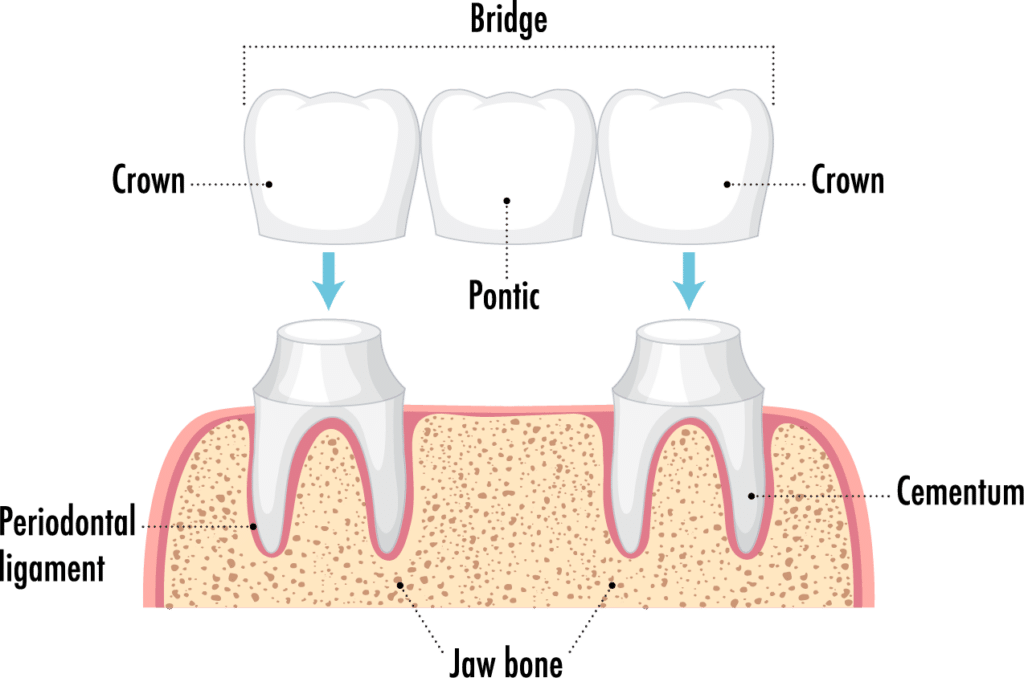Visit Bright Now! Dental located in , for expertly crafted dental bridges. Among our range of tooth replacement solutions, dental bridges are one of the most popular, effective, and economically viable choices.
Numerous reasons might lead someone to consider a dental bridge, such as filling in gaps created by missing teeth, preventing adjacent teeth from shifting, and restoring the full chewing function. Well-maintained dental bridges can provide years of reliable service with their exceptional durability.
If you’re seeking alternatives to partial dentures or dental implants, either due to personal preference or specific eligibility, dental bridges offer an excellent avenue. At Bright Now! Dental , we focus on tailoring your patient experience to your individual oral health needs, financial considerations, aesthetic inclinations, and the extent of tooth loss.
Our commitment extends to making restorative dentistry accessible through affordable financing options. Our adaptable payment plans are designed to harmonize seamlessly with your monthly budget.
Book your appointment today for a consultation at Bright Now! Dental . Get your customized treatment plan and start on the path to restoring and perfecting your smile!

Step 1: Tooth Preparation – This typically involves removing a small amount of enamel on adjacent teeth to make room for the bridge’s crowns.
Step 2: Impressions – Your dentist will take precise impressions of your prepared teeth. You may also receive a temporary bridge to protect your exposed teeth.
Step 3: Bridge Fabrication – The bridge is fabricated to match the color, shape, and size of your natural teeth for a seamless fit.
Step 4: Fitting the Bridge – Once your custom bridge is ready, your dentist will carefully check the fit and make any necessary adjustments to ensure comfort and functionality.
Step 5: Bridge Placement – Your dentist will use dental cement to secure the bridge in place. The crowns on the adjacent teeth will anchor the bridge, providing stability and support.
Step 6: Final Adjustments – Your dentist will make final adjustments to ensure that your bite is even and comfortable. This step is crucial for proper functionality and long-term comfort.
Step 7: Enjoy Your New Smile – With your dental bridge securely in place, you can now enjoy the benefits of a complete and beautiful smile. Smile with confidence, eat your favorite foods, and savor the improved functionality and aesthetics.
One of the benefits of dental bridges is they are a more affordable option than other popular types of restorations used for missing teeth. Additionally, most dental insurance plans cover at least a portion of your dental bridge treatment, minimizing your total out-of-pocket costs.
Total dental bridge cost near varies based on the types of materials used, the health of the supporting teeth, and the type of implant.
Bright Now! Dental accepts most PPO and HMO dental insurance plans. Our professional dental team will help determine your eligibility for customized bridges and other dental prosthetics to minimize the cost of dental bridges. You can also use our ZIP code tool to see a list of major insurance plans accepted in your selected office.
At Bright Now! Dental, our affordable financing options make it easy to cover the cost of restorative dentistry treatments. Enjoy flexible payment plans that fit your monthly budget. Plus, you can pair financing with your existing dental insurance coverage or our private OneSmile Dental membership plan.
Patients without insurance can take advantage of Bright Now! Dental’s OneSmile Dental Plan, for 20-40% off most dental services for one low annual fee.
For affordable and comprehensive dental care, including dental bridges , choose Bright Now! Dental. Our holistic approach to oral health care—including tooth replacement options like dental bridges—ensures you’ll have a strong, natural-looking smile you feel confident about showing off. Reserve your consultation now.